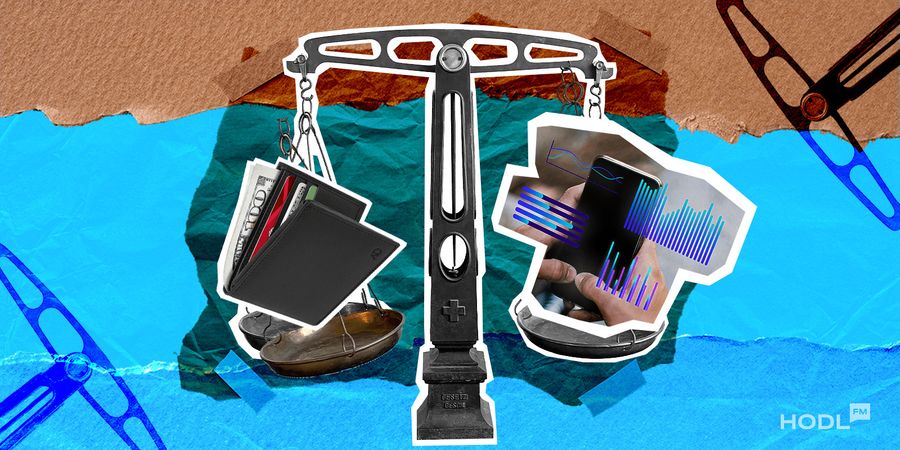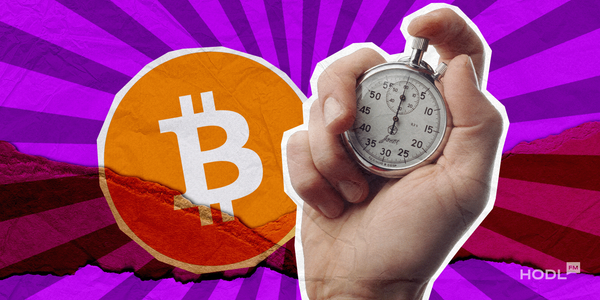Do you think your crypto is safe? Well, our crypto is only as secure as the place you store them. Whether you’re a seasoned crypto-enthusiast or a wide-eyed noob, the crucial choice between crypto wallets and exchanges can leave you in a bit of a conundrum. In either case, you’re in luck, because we’re here to dissect the pros, cons, and all the nitty-gritty details of these two main methods of crypto storage, paving the way for you to make an informed decision. Also, we will shed light on the famous saying “Not your keys, not your coins” at the end.
Crypto Wallets: A Deep Dive
A crypto wallet is like a digital vault where your cryptocurrencies reside. Available in several forms such as software (including desktop, mobile, web), hardware, and paper wallets, each type has its own set of advantages and potential pitfalls.

The primary role of a crypto wallet is to safely store and manage your private keys, which are cryptographically secure digital codes known only to you and your wallet. Your private keys authorize transactions, enabling you to manage your cryptocurrency. However, it’s essential to handle your private keys with utmost care. Lose them, and you’ll lose access to your cryptocurrency holdings – a nightmare scenario for any investor.
Read more: Cryptocurrency Security or How to Protect Yourself Against Cyber Threats
Each variant of crypto wallets caters to specific needs. For example, hardware wallets, which store your private keys offline, offer an extra layer of security against cyber threats, making them an ideal choice for storing large amounts of cryptocurrency. On the other hand, software wallets, which are more user-friendly, can be a good fit for everyday transactions and small amounts.

Some wallets also allow interaction with decentralized applications and provide functionalities like token swapping, further enriching the user experience. Here are some of the most popular crypto wallets:
Coinbase Wallet: Offered by Coinbase, this hot wallet supports numerous crypto assets and provides seamless connections to major decentralized exchanges. It’s a non-custodial wallet, ensuring users maintain full control over their private keys.
SafePal: SafePal, a hot wallet that supports all major cryptocurrencies, caters to millions of users worldwide. Offering both hot and cold storage options, it integrates with Binance for easy trading.
Crypto.com DeFi Wallet: Specializing in decentralized finance (DeFi) crypto assets, this wallet provides direct access to the Crypto.com exchange for buying and selling crypto.
MetaMask: A user-friendly, browser-based wallet that allows interaction with Ethereum-based decentralized applications directly from the browser.
Trust Wallet: A secure mobile wallet that supports a wide array of cryptocurrencies and allows users to stake crypto and earn rewards.
BitGo: BitGo, a web-based hot wallet, caters to businesses and institutional investors by supporting up to 400 different cryptocurrencies and offering both hot and cold storage.
Ambire: A noncustodial, browser-based wallet built on the Ethereum blockchain that simplifies the process of buying, selling, and investing in Ethereum-based crypto assets by generating smart contracts.
Cryptocurrency Exchanges: A Broad Perspective
Cryptocurrency exchanges are bustling marketplaces where traders can buy, sell, and swap their cryptocurrencies. Like banks, they manage your funds, but instead of a physical vault, they store your cryptos digitally.
These exchanges are divided into two camps: centralized and decentralized. Centralized exchanges, much like conventional banks, act as middlemen. They hold your funds, keep track of your balances, and facilitate trading. However, as we learned from the numerous hacks and security breaches, these middlemen can be susceptible to attacks.
Read more: Cryptocurrency 101: A Beginner’s Guide to Understanding Cryptocurrencies, and Their Advantages
Decentralized exchanges (DEXs) on the other hand, allow peer-to-peer trading without any intermediaries. They are perceived as more secure but can be quite challenging to navigate for beginners. Below you will find the most popular exchanges:
Uniswap: A decentralized exchange (DEX) that introduced the automated liquidity protocol. Uniswap provides decentralized token swapping of ERC20 tokens on the Ethereum blockchain and is known for facilitating quick transactions and maintaining user privacy.
SushiSwap: Another popular DEX, SushiSwap is a fork of Uniswap, offering features like yield farming and staking. It employs smart contracts and liquidity pools to enable peer-to-peer trading.
PancakeSwap: The most popular DEX on the Binance Smart Chain, PancakeSwap offers features like token swaps, farming, and lottery games. It eliminates the need for KYC and offers a user-friendly interface.
Binance: As one of the leading centralized exchanges (CEX), Binance offers trading for a multitude of cryptocurrencies, along with features like futures trading, staking, and more. It is renowned for its high liquidity and user-friendly interface.
Kraken: A popular CEX known for its security measures and wide range of supported cryptocurrencies. It also offers futures trading and margin trading
Coinbase: One of the largest CEXs in the crypto space, Coinbase is known for its user-friendly interface, making it suitable for beginners. It supports a wide variety of cryptocurrencies and offers features like staking.
Security Considerations
When it comes to safeguarding your cryptos, the choice between wallets and exchanges boils down to trust. Do you trust yourself more than a third party? If yes, wallets might be your go-to option. You hold your private keys and are fully responsible for the security of your assets.
Exchanges, while generally secure, have been known to fall prey to security breaches. They do have protective measures like two-factor authentication, but remember, even Fort Knox was breached once! Therefore, always ensure you’re using reputable exchanges and take full advantage of their security measures.

User Experience and Accessibility
If convenience is your priority, exchanges may be your best bet. They offer a straightforward interface to buy, sell, and trade cryptos, not to mention the ability to access a wide variety of cryptocurrencies. However, their systems can be complex and daunting for newbies.
Wallets, particularly software wallets, tend to have more user-friendly interfaces. But, remember, convenience shouldn’t come at the cost of security. Choosing a method that strikes the right balance between user experience and security is key.
Which Option Is Right for You? Finding Your Crypto Comfort Zone
The right storage method depends on the kind of crypto enthusiast you are. Long-term hodlers may prefer the safety of wallets, while active traders might find exchanges more suitable. Casual users? You might find value in both.
The beauty of the crypto world is its flexibility. You can use both wallets and exchanges, combining their strengths for enhanced flexibility and security. Remember, in this fast-paced world of cryptocurrency, your comfort and confidence in managing your assets matter the most.
Factors to Consider when Choosing Between Wallets and Exchanges
Choosing between crypto wallets and exchanges isn’t a one-size-fits-all decision. It often boils down to your individual needs, comfort level with crypto, and security concerns. Below are some key factors to consider:
Security: If you trust yourself more than a third party with your crypto assets, wallets might be your preferred option. Remember, the safety of storage methods varies, with both centralized institutions and self-custody wallets carrying potential risks.
Ease of Use: If you value convenience, exchanges might be your go-to. They offer an intuitive interface for buying, selling, and trading cryptos, as well as access to a wide range of cryptocurrencies. However, they can be complex for newcomers. Wallets, especially software wallets, generally have more user-friendly interfaces.
Frequency of Transactions: Active traders might find the real-time trading capabilities of exchanges more appealing, while long-term holders might prefer the safety and control offered by wallets.
Diversification: Some investors prefer to spread their assets across both wallets and exchanges, combining the strengths of both for enhanced flexibility and security.
Familiarity with Technology: Your tech savviness can also influence your choice. While wallets require a certain degree of technical knowledge, particularly for handling private keys, exchanges often provide a more straightforward user experience.
Custody of Assets: If retaining control of your private keys is a priority, a self-custody wallet or decentralized exchange would be your best bet. Centralized exchanges, while offering custodial wallet services, manage your private keys on your behalf, which might not sit well with everyone[1].
Not Your Keys, Not Your Coins, or Are They?

The saying “Not Your Keys, Not Your Coins” is a popular maxim within the cryptocurrency community. This phrase encapsulates a fundamental principle of cryptocurrency ownership: if you do not possess the private keys to your digital assets, you do not have absolute control over those assets. These keys are akin to the passwords to your digital vault; without them, your access to your cryptocurrencies is reliant on third parties, such as exchanges.
Take, for instance, the collapse of the FTX exchange in November 2022. This event served as a glaring example of the risks inherent in entrusting your assets to custodial exchanges. With the exchange’s meltdown, users found themselves unable to withdraw their assets, trapped by a liquidity crisis that they had no power to remedy. Because cryptocurrencies do not have federal deposit insurance like traditional banking systems, the only recourse for the users was to rely on bankruptcy courts to attempt to recover their funds.

Even when such exchanges are functioning normally, they may limit access to your coins or prevent you from obtaining forked cryptocurrencies. The potential for exchange failures or cyber-attacks also poses a persistent risk, as history has shown numerous instances of breaches that resulted in significant losses for users.
On the flip side, while self-custodial wallets grant users full control over their assets by giving them possession of the private keys, they are not entirely devoid of risk. Users must be incredibly careful in managing their private keys. Losing these keys means losing access to your crypto assets forever, a harsh lesson learned by those who have accidentally lost or forgotten their keys. Furthermore, self-custodial wallets can also be targeted by cybercriminals, and users may lack the technical knowledge to properly secure their wallets against such threats.

Ultimately, the decision between using exchanges or self-custodial wallets hinges on user preference and risk tolerance. While some users might feel more secure having direct control over their keys, others may prefer the convenience offered by exchanges and are willing to accept the risks that come with that choice. A blended approach, diversifying crypto holdings between both custodial and non-custodial accounts, can be an effective strategy to mitigate the risks and leverage the strengths of both options. You do you, hodlers!
Disclaimer: All materials on this site are for informational purposes only. None of the material should be interpreted as investment advice.Please note that despite the nature of much of the material created and hosted on this website, HODL FM is not a financial reference resource and the opinions of authors and other contributors are their own and should not be taken as financial advice. If you require advice of this sort, HODL FM strongly recommends contacting a qualified industry professional.




